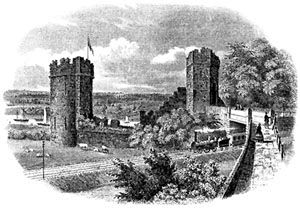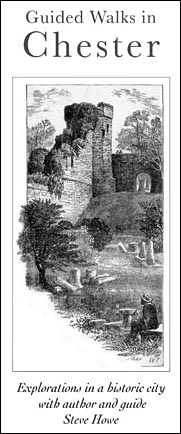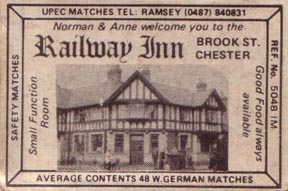  local proverb
dating from 1611 says, 'At
Easter
the
wind
is
at
Chester' "because
it
is
good
for
Ireland: local proverb
dating from 1611 says, 'At
Easter
the
wind
is
at
Chester' "because
it
is
good
for
Ireland:
T'enrich
the
towne
and
trade
of
shipping,
The
winde
which
evermore
is
skipping,
Is
said
to
come
and
dwell
at
Chester" Wordworth
Dictionary
of
Proverbs p
174.
 William
Camden was
a
schoolmaster
and
traveller who
wrote
extensively
on
historical
and
topographical
subjects.
He
is
best
known
for
his Britannia,
the
first
published
detailed
description
of
Britain.
The
following
extracts
are
from
the
1607
(Latin)
edition,
the
additions
in
brackets
are
supplied
by
the
English
translator, Philemon
Holland... William
Camden was
a
schoolmaster
and
traveller who
wrote
extensively
on
historical
and
topographical
subjects.
He
is
best
known
for
his Britannia,
the
first
published
detailed
description
of
Britain.
The
following
extracts
are
from
the
1607
(Latin)
edition,
the
additions
in
brackets
are
supplied
by
the
English
translator, Philemon
Holland...
"The
Twentieth
Legion were
at
last
seated
in
this
City,
(which
I
believe
had
not
been
then
long
built)
for
a
check
and
barrier
to
the
Ordovices.
Tho'
I
know
some
do
aver
it
to
be
older
than
the
Moon,
to
have
been
built
many
thousands
of
years
ago
by
the
gyant
Leon
Vaur...at
this
day
there
remain
here
few
memorials
of
the
Roman
magnificence,
besides
some
pavements
of
Chequer-works...
The
City
is
of
a
square
form,
surrounded
with
a
wall
two
miles
in
compass,
and
contains
eleven
Parish-Churches.
[But
that
of
St.
John's
without
the
North-gate,
was
the
fairest,
being
a
stately
and
solemn
building,
as
appears
by
the
remains
wherein
were
anciently
Prebendaries,
and
(as
some
write)
the
Bishop's
See.
Upon
a
rising
ground
near
the
river,
stands
the
Castle,
built
by
the
Earl
of
this
place,
wherein
the
Courts
Palatine
and
the
Assizes
were
held
twice
a
year.
The
buildings
are
neat,
and
there
are
Piazza's
on
both
sides
along
the
chief
street.
[They
call
them
Rowes,
having
shops
on
both
sides,
through
which
a
man
may
walk
dry
from
one
end
unto
the
other.
Nor
is
there
now
any
requisite
wanting
to
make
it
a
flourishing
city,
only
the
sea
indeed
is
not
so
favourable,
as
it
has
been,
to
some
few
Mills
that
were
formerly
situated
upon
the
river
Dee;
for
it
has
gradually
withdrawn
it
self,
so
that
the
town
has
lost
the
benefit
of
them,
and
the
advantage
of
a
harbour,
which
it
enjoy'd
heretofore.
It's
situation,
in
Longitude,
is
20
degrees
and
23
minutes;
in
Latitude,
53
degrees,
11
minutes"
  Henry
Hastings fifth
Earl
of
Huntingdon (1586-1643),
succeeded
his
grandfather
as
earl
in
1605,
and
was
Lord
Lieutenant
of
Leicestershire
and
Rutland.
His
family
seat
was
at
Ashby-de-la
Zouch,
and
he
made
the
following
notes
on
a
journey
from
Leicestershire
to
the
Cheshire
home
of
his
son-in-law,
Sir
Hugh
Calverley... Henry
Hastings fifth
Earl
of
Huntingdon (1586-1643),
succeeded
his
grandfather
as
earl
in
1605,
and
was
Lord
Lieutenant
of
Leicestershire
and
Rutland.
His
family
seat
was
at
Ashby-de-la
Zouch,
and
he
made
the
following
notes
on
a
journey
from
Leicestershire
to
the
Cheshire
home
of
his
son-in-law,
Sir
Hugh
Calverley...
"West
Chester
is
a
large
old
city.
There
is
ten
parish
churches
in
it.
The
streets
at
the
coming
in
are
large,
but
the
cross
street
which
is
in
the
middle
of
the
city
is
made
narrower
and
seems
not
so
fair
as
otherwise
it
would
by
reason
of
pentices
that
go
on
both
sides
of
the
streets
which
they
go
up
to
in
divers
places
with
stairs,
that
one
may
go
dry
in
any
foul
weather.
The
shops
and
houses
are
behind
those
walles,
the
houses
for
the
most
part
old
and
builded
of
timber.
There
is
upon
the
side
of
the
town
an
old
ruinous
castle,
yet
some
buildings
within
it,
which
stands
upon
the
river
Dee.
There
are
mills
hard
by
upon
this
river
eseemed
to
be
worth
£500
a
year.
There
is
a
piece
of
ground
a
mile
about
encompassed
with
water,
called
the
Roe
Dee,
where
barks
of
some
20
or
30
tons
come
up
from
Nesson
[Neston],
which
carry
passengers
into
and
out
of
Ireland.
There
is
a
fine
bowling
green
in
this
ground,
which
is
rich
and
worth
30s.
or
40s.
an
acre
per
annum.
The
city
used
to
train
their
soldiers
there
and
to
run
horse-matches.
In
the
Castle,
near
the
County
Hall,
is
a
reasonable
fair
room
beneath
stairs
which
they
call
the
Exchequer,
where
the
Chamberlain
of
Chester
or
his
vice-Chamberlain
sits
four
times
in
the
year,
about
a
fortnight
or
three
weeks
at
a
time,
and
hears
all
causes
for
trial
of
lands,
and
his
judgment
is
the
final
ordering
of
all
matters
within
the
County
Palatine.
There
is
no
insignia
of
the
office
but
that
he
hath
at
the
times
of
sitting
a
tipstaff
and
a
pursuivant
that
goes
before
him,
and
when
he
sits
in
the
court
the
County
Palatine
seal
in
a
purse
of
velvet
with
the
arms
of
the
County
Palatine
embroidered
upon
it
is
laid
in
the
Exchequer
upon
a
cushion
on
the
table
before
him.
There
hangs
up
by
the
wall
side
a
broad
and
a
long
sword
in
an
old
scabbard
embossed
and
studded,
which
when
Hugh
Lupus,
Earl
of
Chester,
was
demanded
by
the
King's
officers
how
he
held
the
County Palatine
of
Chester,
he
answered
to
the
then
Attorney
General
who
brought
a
Quo
Warranto against
him,
that
he
held
it
'per
gladium
sicut
rex
tenebat
per
coronam.'
"
 In
his
work The
Vale
Royal
of
England,
published
in
1656, Daniel
King wrote
of
Cheshire
folk: In
his
work The
Vale
Royal
of
England,
published
in
1656, Daniel
King wrote
of
Cheshire
folk:
"They are of a nature very gentle and courtious... of stomach stout, bold and hearty; of stature tall and mighty; withall impatient of wrong, and ready to resist the enemy or stranger that shall invade their country; the very name whereof they cannot abide; and namely, of a Scot...
Likewise be the women very friendly and loving, painful in labour, and in all kind of housewifery expert, fruitful in bearing of children after they are married, and sometimes before."
 Randle
Holme
III (1627-99)
was
the
third
of
four
successive
genealogists of
Chester
of
this
name.
He
was
also
a
heraldic
painter
and
author
of The
Academy
of
Armory,
1688,
said
to
be
the
first
book
printed
in
the
city.
His
father
was
a
royalist
Alderman
of
Chester
during
the
Civil
War
siege
and
the
son
vividly
records
here
the
damage
that
was
caused... Randle
Holme
III (1627-99)
was
the
third
of
four
successive
genealogists of
Chester
of
this
name.
He
was
also
a
heraldic
painter
and
author
of The
Academy
of
Armory,
1688,
said
to
be
the
first
book
printed
in
the
city.
His
father
was
a
royalist
Alderman
of
Chester
during
the
Civil
War
siege
and
the
son
vividly
records
here
the
damage
that
was
caused...
"Thus
of
the
most
anchante
and
famous
cittie
of
Chester,
in
times
past;
but
now
beholde
and
mark
the
ruines
of
it
in
these
present
times,
within
these
few
years,
namely,
within
these
three
years,
1643,
1644,
1645,
the
particular
demolitions
of
it,
now
most
grievous
to
the
spectators,
and
more
woefull
to
the
inhabitants
thereof.
Without
the
Barrs,
the
chappelle
of
Spittle,
with
all
the
houses,
and
gardens,
and
edifices
there,
upon
Sir
William
Brereton's
first
assault
made
upon
the
cittie.
All
the
houses,
barns
and
buildings
near
to
the
Barrs,
with
Great
Boughton
and
Christleton.
In
the
Foregate
Street,
Cow-lane,
St.
John's
Lane,
with
those
houses
next
to
the
Eastgate,
all
burned
to
the
ground.
Without
the
Northgate,
from
the
said
gate
to
the
last
house,
Mr.
Duttons
[Jollye's
Hall],
all
burned
and
consumed
to
the
ground,
with
all
the
lanes
to
the
same,
with
the
Chappelle
of
Little
St.John,
not
to
be
found,
when
the
mud
walls
and
suburbs
were
surprised,
Saturday
morning
.
.
.
 From
Dee-bridge
over
the
water,
all
that
long
street
called
Handbridge,
with
all
the
lanes,
barnes
and
buildings
about
it,
ruinated
and
burnt
to
the
ground
when
Holt
bridge
was
taken
by
the
Parliament
partie
and
they
came
on
Wales
side.
After
a
great
part
of
it
being
built
againe,
was
burnt
to
the
ground
after
the
rout
of
the
King's
partie
at
Namptwich
and
the
Parliament
partie
comeing
over
the
ford
the
second
tyme
into
Wales. From
Dee-bridge
over
the
water,
all
that
long
street
called
Handbridge,
with
all
the
lanes,
barnes
and
buildings
about
it,
ruinated
and
burnt
to
the
ground
when
Holt
bridge
was
taken
by
the
Parliament
partie
and
they
came
on
Wales
side.
After
a
great
part
of
it
being
built
againe,
was
burnt
to
the
ground
after
the
rout
of
the
King's
partie
at
Namptwich
and
the
Parliament
partie
comeing
over
the
ford
the
second
tyme
into
Wales.
All
the
glover's
houses
under
the
walles
of
the
cittie
taken
downe
about
the
same
tyme.
All
the
buildings
and
houses
at
the
Watergate,
upon
the
Roodee,
pulled
downe
at
the
same
tyme.
Besides
the
Halls
of
severall
gentlemen
in
the
same
cittie,
and
near
to
it,
as
the
Bache
hall,
Mr.
Edw.
Whitbie's,
the
recorder.
Blacon
hall,
Sr.
Randall
Crewe's.
Overleigh
hall
or
Hough
Greene
house,
Mr.
Ellis.
Flookersbrooke
hall,
Mr.
Shingleton's
in
lease,
but
Sir
Tho:
Smith's
land.
The
ffullers
or
Walkers
mills.
Hoole
hall,
Mr.
Bunburie's.
The
Water
tower
at
Dee
bridge,
shot
downe
in
tyme
of
siege.
Bretton
hall,
Mr.
Ravenscroft's,
plundered
and
burnt
little
after
the
parliament
partie
first
goeing
into
Wales;
when
they
fled
back
againe,
Chester
soulders
tooke
it
and
about
twenty
soulders
that
were
in
garrison
in
it.
The
Nunne's
within
the
cittie,
Sr.
Will
Brereton's
plundered
and
plucked
downe
at
the
first
beginning
of
the
wars
because
he
was
of
the
parliament
partie
against
King
and
cittie.
The
Lord
Cholmondeley's
house
in
St.
John's
Churchyard,
plucked
downe
and
burnt
by
the
Parliament
partie
as
they
lay
in
siege
about
Chester.
Mr.
William
Gamull's
house
nere
the
Newgate,
with
the
new
gate
house
which
was
his
[Mr.
John
Werden's
house
near
unto
it].
The
destruction
of
divers
other
houses
in
the
cittie,
with
grenadoes,
not
a
house
from
Eastgate
to
the
middle
of
Watergate
street
on
both
sides
but
received
some
hurt
by
them,
many
sleyne
by
the
fall
of
houses
which
were
blowen
up,
St.
Peter's
Church
much
defaced
and
pews
torne,
and
all
windows
broken
by
two
grenadoes
that
fell
therein.
The
ruines
of
stalls,
pentices,
doores,
trees
and
barnes,
in
divers
lanes
and
places
in
the
cittie.
The
destroying
of
the
Bishop's
palace,
with
stables
in
the
barne
yard,
and
the
ruine
of
the
great
churche.
The
charge
of
mudd
walles,
sodding,
carrying
and
edifying
them,
with
centrye
houses,
both
without
the
walles
and
within
the
walles.
The
drawing
dry
of
the
cittie's
stockes,
plate,
rentes,
and
collections,
not
knowne,
all
which
losses,
charges
and
demolishments,
in
opinion
of
most,
will
amount
to
two
hundred
thousand
pounds
att
the
least;
so
farre
hath
the
God
of
heaven
humbled
this
famous
cittie;
and
note,
here,
that
if
Jerusalem,
the
particular
beloved
cittie
of
God,
of
which
it
is
said
in
sacred
writ,
'count
her
towers,
marke
well
her
bulwarkes,
in
man's
judgement
invincible;
yet
her
sinne
provoked
God
soe,
that
he
leaved
not
a
stone
upon
another,
that
this
may
be
an
advertisement
to
us,
that
God's
mercy
is
yett
to
be
found,
since
he
hath
left
us
soe
many
streets,
lanes,
and
churches,
yet
unmolested.
God
grant
us
faith, patience,
and
true
repentance,
and
amend
ment,
that
a
worse
danger
befall
us
not.
Amen."
 "Chester
the
loyal
city,
Chester
with
its
quiet
dignity,
became
a
beleaguered
fortress. "Chester
the
loyal
city,
Chester
with
its
quiet
dignity,
became
a
beleaguered
fortress.
Houses
flamed,
mines
exploded,
and
the
spectre
of
starvation
stalked
its
streets.
Chester
possessed
strategic
importance.
It
was
the
door
through
which
a
steady
stream
of
men
and
munitions
flowed
to
strengthen
the
royal
cause.
Families
of
quality
whose
homes
graced
the
parklands
of
the
County
Palatine
had
their
city
homes
in
Chester.
It
was,
by
the
nature
of
things,
the
rendezvous
of
these
parts.
Thus
it
became
the
prize
for
which
men
strove"
Norman
Tucker:
'Master
of
the
Field'
1949
Writing
in
the
1830s, local author and guide Joseph
Hemingway commented
upon
these
times:
"The
incessant
drains
upon
their
property,
in
the
shape
of
levies
for
the
maintainance
of
the
garrison,
and
the
support
of
their
fugitive
prince,
had
levelled
the
different
classes
of
the
community,
and
reduced
the
whole
to
one
common
condition
of
absolute
beggary.
Desolation
and
destruction
marked
the
suburbs,
which
presented
an
undistinguished
mass
of
ruins,
the
only
remains
of
dwellings,
once
the
peaceful
habitations
of
content
and
security;
while
our
walls
and
edifices
within
the
city
were
defaced,
or
battered
down
by
the
destructive
cannon.
In
addition
to
this,
the
city
lands
were
all
mortgaged,
the
funds
quite
exhausted,
the
plate
melted
down,
and
the
churches,
particularly St. John's being
so
long
in
the
possession
of
the
enemy,
greatly
damaged".
You
can
see
a
map
of
the
city's
defences
at
the
time
of
the
Civil
War,
published
in
Hemingway's Panorama
of
the
City
of
Chester (1836) here.
Move
on
later
into
the Seventeenth
Century and
even
more
traveller's
tales
of
Chester...
|




 From
Dee-bridge
over
the
water,
all
that
long
street
called
Handbridge,
with
all
the
lanes,
barnes
and
buildings
about
it,
ruinated
and
burnt
to
the
ground
when
Holt
bridge
was
taken
by
the
Parliament
partie
and
they
came
on
Wales
side.
After
a
great
part
of
it
being
built
againe,
was
burnt
to
the
ground
after
the
rout
of
the
King's
partie
at
Namptwich
and
the
Parliament
partie
comeing
over
the
ford
the
second
tyme
into
Wales.
From
Dee-bridge
over
the
water,
all
that
long
street
called
Handbridge,
with
all
the
lanes,
barnes
and
buildings
about
it,
ruinated
and
burnt
to
the
ground
when
Holt
bridge
was
taken
by
the
Parliament
partie
and
they
came
on
Wales
side.
After
a
great
part
of
it
being
built
againe,
was
burnt
to
the
ground
after
the
rout
of
the
King's
partie
at
Namptwich
and
the
Parliament
partie
comeing
over
the
ford
the
second
tyme
into
Wales.  "Chester
the
loyal
city,
Chester
with
its
quiet
dignity,
became
a
beleaguered
fortress.
"Chester
the
loyal
city,
Chester
with
its
quiet
dignity,
became
a
beleaguered
fortress.